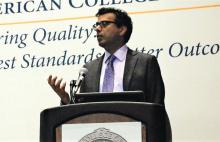BOSTON – The success of surgical safety checklists to reduce postoperative mortality appears to depend not only on implementation but also on the degree to which a hospital embraces a culture of teamwork, Atul Gawande, MD, MPH, FACS, said at the annual clinical congress of the American College of Surgeons.
The session “Checking in on the Checklist – Ten Years of the WHO Surgical Safety Checklist” moderated by Thomas Geoghegan Weiser, MD, FACS, and Alex B. Haynes, MD, FACS,considered the progress of the past decade in implementing the World Health Organization initiative in medical institutions around the world.
Team-based approaches to the checklist accompanied by other institutional support have demonstrated double-digit reductions in mortality, while in contrast, a mandate-only approach resulted in a 0% change, said Dr. Gawande, a general and endocrine surgeon at Brigham and Women’s Hospital and professor in the department of health policy and management at the Harvard T.H. Chan School of Public Health and the Samuel O. Thier Professor of Surgery at Harvard Medical School, all in Boston.
Variables including respect among team members, clinical leadership, and assertiveness on behalf of patient safety appeared to be predictive of postoperative death rates in one recent implementation of the WHO Surgical Safety Checklist, he added.
Dr. Gawande said the 29-item surgical safety checklist has earned support but also skepticism and “some outright opposition” in the nearly 10 years since landmark study published in the New England Journal of Medicine, coauthored by Dr. Haynes, reported that the approach cut mortality by 47% and postoperative complication rates by 36%, on average, in a diverse group of eight hospitals throughout the world.
“It’s a challenge in a fundamental way, to our values,” Dr. Gawande told attendees. “What we have valued in our life as surgeons is our autonomy as clinicians, and here was an approach which required you to work with different values: humility, discipline, teamwork.”
That 47% mortality reduction was achieved in a clinical trial setting with “very carefully selected sites” that were enthusiastic about giving the checklist a try, and toward that end, received weekly support, Dr. Gawande said.
Subsequent implementations of the checklist have had varying success rates, he said.
Implementations that have included a mandate plus regular feedback have yielded mortality reductions upward of 26%he said, while a mandate plus team training reduced mortality by 18% in a Veterans Health Administration hospital setting, according to Dr. Gawande. By contrast, a mandate-alone approach in Ontario yielded a 0% reduction in mortality.
“What we came to realize is a kind of formula that underlies how you create change in organizations generally, where you’re trying to create systems that make it easier for people to get the right kinds of things done,” Dr. Gawande said.
“You have a systems tool that has been carefully crafted around the ‘killer items’ – the failure points that even experts fail at – you have an implementation pathway, and then you bring it into a ready environment where people are capable and they’re motivated,” he explained.
A South Carolina initiative that was voluntary and included light-touch support yielded a 22% reduction in hospitals that completed the adoption program, Dr. Gawande said. Of note, investigators in the Safe Surgery 2015: South Carolina Initiative found that perceptions of safety among operating room personnel were associated with the all-cause 30-day postoperative death rate.
“The team found in South Carolina that the predictor of how much change you get is how effective your implementation was in changing the culture to be more team oriented,” Dr. Gawande said.
“You could recognize it by how much change you saw in what the frontline people reported about how much they are respected, how much clinical leadership was actually involved in the way the team works, and the ultimate test; how assertive could people be in raising issues,” he continued. “Did they feel safe to raise issues, and not get their head bitten off, but in fact, find that what they offered had value.”
Dr. Gawande is the founder and executive director of Ariadne Labs, a center for health systems innovation, and the chairman of Lifebox, a not-for-profit organization.
SOURCE: Gawande AA et al. ACS Clinical Congress 2018, Session PS232.

